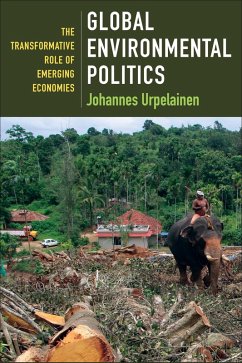Emerging economies have fundamentally transformed global environmental politics. Led by China and India, they increasingly make or break international negotiations, which now require agreement among a large number of governments with widely varied preferences. Emerging economies-which still suffer from widespread poverty and frequently struggle with policy implementation-often feel that Western-led initiatives neglect their needs. What does the global environmental policy landscape look like in the age of a rising Global South?
This book explains why emerging economies have come to dominate global environmental politics and examines the implications for future international cooperation. Johannes Urpelainen shows that emerging economies continue to prioritize economic growth and often have limited institutional capacity to contain the environmental destruction that it causes. However, he argues, despite barriers to cooperation, innovative bargaining and institutional design offer a way forward. Bottom-up agreements that respect national sovereignty and invest in capacity building hold more promise than traditional top-down treaties with binding commitments.
The book features detailed discussions of attempts to address hazardous chemicals, loss of biodiversity, and climate change; a comparative analysis of China and India; and case studies of nine other emerging economies around the world. Global Environmental Politics is an essential, forward-looking overview of today's most pressing international issue.
This book explains why emerging economies have come to dominate global environmental politics and examines the implications for future international cooperation. Johannes Urpelainen shows that emerging economies continue to prioritize economic growth and often have limited institutional capacity to contain the environmental destruction that it causes. However, he argues, despite barriers to cooperation, innovative bargaining and institutional design offer a way forward. Bottom-up agreements that respect national sovereignty and invest in capacity building hold more promise than traditional top-down treaties with binding commitments.
The book features detailed discussions of attempts to address hazardous chemicals, loss of biodiversity, and climate change; a comparative analysis of China and India; and case studies of nine other emerging economies around the world. Global Environmental Politics is an essential, forward-looking overview of today's most pressing international issue.
Dieser Download kann aus rechtlichen Gründen nur mit Rechnungsadresse in A, D ausgeliefert werden.









